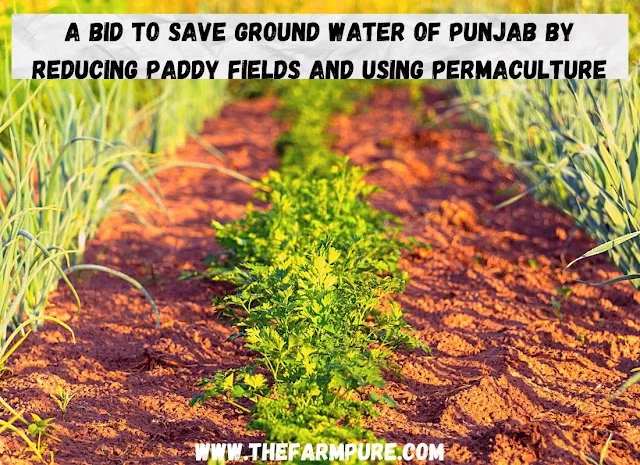The largest problem, experts say, is that the paddy-wheat monoculture, under which farmers are just incentivised to produce rice and wheat, which isn’t Punjab’s traditional crop cycle. As a result, farmers have been required to draw more and more groundwater, use additional substances, and take more loans.
“There’s acute water pollution in Punjab since it’s the largest consumer of chemical inputs like pesticides, fertilisers and insecticides from the nation. Water recharge from farms farther pollutes underground water, Which Makes It palatable for drinking,”
The area under wheat and paddy in Punjab at 1960-61 was 14 lakh hectares (LHA) and 2.27 LHA, respectively, that climbed to 35.08 LHA and 29.20 LHA respectively, by 2019-20.
Paddy crop absorbs 5,377 litres of water per kilogram of produce, compared to 1,500 minutes for wheat. So, on account of this paddy-wheat monoculture, Punjab’s farmers have been over-exploiting groundwater resources by over 14 lakh tubewells that waters two-thirds of Punjab’s cultivated area.
According to some 2017 Central Ground Water Board report, the amounts in Punjab in the pre-monsoon period of 2017 dropped to 22.77 meters, compared to 20 metres in 2007. However, the nationwide average was 5-10 meters. From Punjab’s 137 Blocks, as many as 110 encounters the over-exploited class.
 |
| Permaculture way of farming |
Agriculture and Environment Centre (AEC), a group of Sikh activists, have taken the initiative to execute Jal Chetna Yatra (water consciousness march) Under jhona ghatao Punjab Bachao (reduce paddy, rescue Punjab) from June 7 to inspire people not just to decrease area under paddy and diversify, but also to reverse into agro-forestry and planting little forests of classic trees in parts of the lands to improve the forest cover in the State of Punjab.
They’re in touch with agriculture experts, environmentalists, and farmers into varied or natural farming, requesting them to discuss their own experiences and experiments on social networking sites like Facebook, YouTube, Twitter, etc. As stated by the group, they’re reaching out to non-resident Punjabis to place the example in their lands. “Our goal is to earn at least 500 acres free of paddy ( Rice field) this season. It might not be that big area, but we need to put out some examples. Although our notion is that the cultivation of paddy ought to be decreased. Still, for the immediate decrease in over-exploitation of water, we’re also amplifying the alternative techniques of paddy cultivation,” explained Mandhir Singh and Parmjeet Singh.
They began using the Jal Chetna Yatra on June 7. The activists have met environmentalist Padma Sri awardee Baba Sewa Singh of Khadoor Sahib and Padma Bhusan awardee Dr Inderjeet Kaur Pingalwara in Amritsar organic farming the farm of Pingalwara close to Amritsar and also have shared their own experiences. The activists, who’ve motivated some farmers into organic farming or diversified into other crops, have amplified their methods and experiences through interpersonal networking. For example, farmer Raja Singh of Dosanjh village near Moga, that couldn’t visit Canada despite obtaining a visa because of illness of his dad and began diversified farming on his family property, advised that in between every row of sugarcane he had been having distinct crop including veggies and in 1 acre he had been having 15 distinct produces annually. He and his spouse Jasleen process all of their products and then market them. “We’re especially urging non-resident Punjabis, such as some gurdwara committees overseas, to come forward and put examples in their lands back home. Quite a number of these have taken up the need of the hour to diversify and to have woods on chunks of the lands,” they stated. “Punjab needs comprehensive approach and answer.
The only decrease in paddy cultivation isn’t sufficient, and we will need to raise the green cover in the country, which is only at 6 percent today. So on July 28, we’re planning to have a convention where we will have agriculture experts, environmentalists and farmers that are successful in ensuring comprehensive answers could be brought before the people,” they said.
🔬 Reviewed for Scientific Accuracy by:
Dr. Rashmi Gautam, MBBS, MD – Professor & Head, Department of Pathology
With over 15 years of academic and clinical experience, Dr. Gautam oversees the scientific and editorial integrity of educational content related to herbs, nutrition, and wellness.
ResearchGate Profile |
ORCID
Dr. Nikhil Khurana, PhD – Biochemist & Functional Nutrition Researcher
Dr. Khurana brings deep expertise in nutraceutical formulation, phytochemistry, and metabolic health. He reviews FarmPURE content to ensure alignment with evolving biochemical and plant-based research.
ORCID
All FarmPURE Blog content is reviewed by domain experts to ensure it reflects the highest standards of botanical integrity, scientific relevance, and practical guidance. Our mission is to promote better health and beauty through the power of organic herbs, spices, and plant-based wellness solutions.
Disclaimer: The information provided in this blog is intended for general wellness and educational purposes only. It is not a substitute for professional medical advice, diagnosis, or treatment. Dr. Rashmi Gautam and Dr. Nikhil Khurana participate as scientific reviewers only, and do not provide or endorse personalized medical recommendations. Always consult a qualified healthcare provider before making decisions related to your health.










